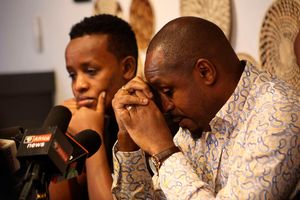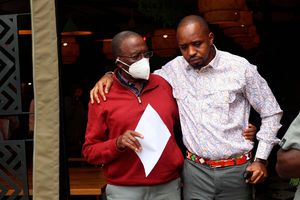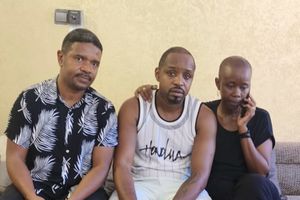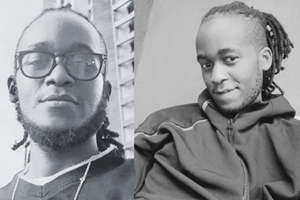
Activist Boniface Mwangi. Background: Protesters on Kimathi Street in Nairobi on June 25, 2024.
At first, he was just another Boniface Mwangi – a photojournalist known more by the name than in person. But as he snapped one click after another, the time spent behind the lens stirred something in him.
Then came the 2007/2008 post-election violence, which found him still in the newsroom. It served as a fire that wrought that inchoate radical in him. With time, a tough-talking, unapologetic activist emerged.
Today, he is better known as The People’s Watchman; a man who has been to hell and back while pushing for causes he believes are worth fighting for. However, he does not consider himself as having been made for the streets.
“I don’t consider protests to be my calling, Mwangi says.
“I’m a photographer. I travel, I speak and teach people. I actually live on a farm, and that’s what I do for a living. But when something goes wrong, I think one of the best ways to show your anger or defiance is through protest.”
In a wide-ranging interview with him, where he described himself as “a good troublemaker”, we revisited the June 2024 protests among other topics.
Which is your most memorable protest?
One of the most famous protests is the “M-Pigs” one, where we delivered pigs to Parliament. We made a statement about the greed of our MPs. However, the one I hold dear is the Lang’ata Road Primary School protest, which we called “Occupy Playground”.
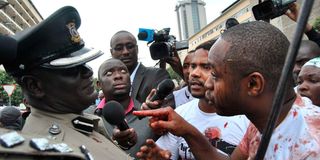
Activist Boniface Mwangi (right) argues with a police officer during a protest outside Parliament buildings in Nairobi on June 12, 2013.
There was an attempt to grab a school playground, and we went in with the children to occupy it. Police officers responded with teargas. People got hurt but one move led to the school being liberated.
By protesting that day, we saved the school. That demonstration led to many others across the country where schoolchildren reclaimed their playgrounds. For me, it was the most impactful protest, especially as a father of young children.
What is your philosophy on protests?
When you protest, you disrupt normal life. That means one gets heard because the government takes notice. I believe in the power of street protests. Things like Uhuru Park were protected by protests. Karura Forest is safe because of protests. Prof Wangari Maathai led the demonstrations to protect the forest.
These actions create awareness. When you protest, you inconvenience people, which gives you free amplification of your message.
If you lock down a road or disrupt ordinary life, the government listens and police respond. Journalists show up. Protesting is the most low-budget thing you can do when faced with injustice.
How did you find out about the first fatality during the June 2024 protests?
I was at home around 8pm scrolling something online when I saw that someone had been shot on Moi Avenue. Police were having trouble moving the body.
The man was taken to a hospital at the Kenya National Archives near StanChart Bank, but police wouldn’t let the Good Samaritans in. When the door was eventually opened, they took him in but he had already died. There was confusion online about the victim. I got into my car and rushed to Moi Avenue where I met Rex Masai’s parents.
What happened at the mortuary?
Normally, when there’s a homicide, you have to wait for police to collect the body. The police came and bundled the body in their vehicle. I took a picture of Rex’s body lying on the street. I then followed the police car to the City Mortuary. I took more pictures of Rex’s mother at the funeral home. Rex was the first fatality of the Finance Bill, 2024 protests.
How did you handle the trauma of visiting the mortuary?
Going to the funeral home was emotionally taxing. I don’t do well with mortuaries. If you look at the picture I took of Rex and his parents, I was outside, looking through the window. The last time I went to pick up a body from a mortuary, I remained at the door. The genesis of the trauma was the 2007-8 post-election violence. Many bodies piled up at the mortuary. The smell and the sight were horrifying.
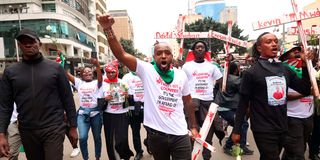
Activist Boniface Mwangi leads a group of protesters along Koinange Street in Nairobi on July 25, 2024.
When I was training as a journalist more than 25 years ago, my first assignment was to cover the City Mortuary. The place was dirty. The smell lingers to date.
Mortuaries bring back those bad memories. I went to the City Funeral Home that day because Rex’s parents needed help securing his body. I stayed outside. I took the first pictures of Rex that were shared online.
What did you do for Rex's family after his shooting death?
We spoke to Rex’s mother and got permission to raise money for his funeral. We raised more than Sh1 million in just a day. We continued planning for Rex’s funeral and also organised the big protest on June 25.
June 25 became historic because protests gained momentum on that day. Kenyans brought their children to the city.
I must, however, say that the first two protests on June 18 and 20 were very peaceful.
There was no looting and no violence. The shops were open, and businesspeople even gave the demonstrators water and safe places.
What was the atmosphere on June 25?
June 25 started like the previous protests. Nairobi was safe from 9am to around 2pm. You could walk around the City Centre, and some shops were still open. The atmosphere was festival-like. It was like a music festival.
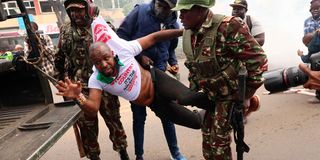
Police officers arresting activist Boniface Mwangi on Kenyatta Avenue in Nairobi during anti-government protest on July 25, 2024.
People came out to exercise their right to protest, in line with the country’s Constitution. They came with their bluetooth speakers, water and were happy to be there.
The interesting part is that there were more women than men on the streets that day. Many parents brought their children . It was safe.
How did the protest take a dark turn?
The atmosphere changed later in the afternoon. I was going down Parliament Road when I realised people were being shot. I turned back towards City Hall. There were teargas canisters on the road, and a vehicle shop was being raided.
City Hall was ablaze. Some people were setting up barricades at the Supreme Court. There were many guns around at that moment and you could tell some of those people were not there to protest. They had other intentions.
The smell of alcohol and sweat was everywhere. That told me it was no longer a peaceful demonstration.
What was the biggest betrayal?
That was when the political class came together to buy time for President William Ruto. This started as a peaceful protest against the Finance Bill, 2024. Kenyans were clear – do not overtax us.
They offered real suggestions. They were against taxing sanitary towels, diapers, bread and other basics.
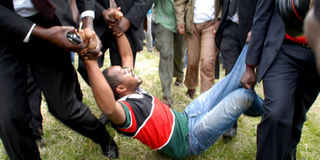
Activist Boniface Mwangi is arrested by police officers after he tried to disrupt the Labour Day celebrations at Uhuru Park, Nairobi on May 1, 2013.
The mood changed the moment Rex was shot dead. Then came the massacre of June 28, 2024. Those children and young people lost their innocence. We reached a tipping point as a nation. We said: “You cannot kill us and lead us.”
June 25 is like our second Independence Day – December 12 1963, which was marked the fall of the Union Jack. June 25 is the day Kenya changed forever.
The political class might not know it yet, but their reign ended that day. No matter what they do, no matter what coalitions they form, they will never escape the full-colour footage.
Those killings were caught in 4K resolution. They will be punished. We saw it and lived it.
No bribe or handshake will erase what happened that day. They must be held accountable for killing children and stealing their future.


